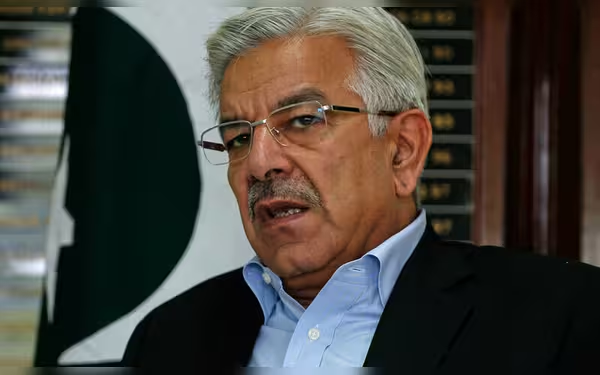Sunday, November 24, 2024 10:28 PM
Government Extends Dialogue Offer to PTI Amid Rising Tensions
- Government offers dialogue to PTI amidst protest plans.
- Khawaja Asif criticizes Imran Khan's leadership.
- Nawaz Sharif questions PTI's past development achievements.
 Image Credits: dawn
Image Credits: dawnThe government offers dialogue to PTI as tensions rise ahead of planned protests, with leaders exchanging sharp criticisms.
In a significant political development, the government has extended an olive branch to the Pakistan Tehreek-e-Insaf (PTI) party, which is currently facing numerous challenges. This offer for dialogue comes amidst rising tensions as PTI prepares for a protest scheduled for November 24. Defence Minister Khawaja Muhammad Asif has publicly stated that the doors for negotiations with PTI are always open. However, he criticized PTI leader Imran Khan for preferring discussions with the establishment rather than engaging with fellow politicians.
During a media briefing in Sialkot, Asif expressed skepticism about the effectiveness of PTI's upcoming rally, suggesting that it would ultimately fail to achieve its objectives. He recounted previous instances where PTI leaders mobilized supporters but abandoned them when faced with law enforcement. Asif labeled the PTI leadership, including Imran Khan, as "hypocrites and liars," asserting that their past protests had not succeeded in making a significant impact.
Meanwhile, Nawaz Sharif, the President of the Pakistan Muslim League-Nawaz (PML-N), echoed Asif's sentiments from London. He dismissed the PTI's protest plans, asserting confidence that it would not hinder Pakistan's progress. Sharif questioned the rationale behind Khan's call for protests, pointing out that during his tenure as Prime Minister, Khan failed to deliver any notable development projects. He challenged Khan to present any evidence of progress made during his time in office.
Nawaz Sharif also addressed concerns regarding the economic situation in Pakistan, expressing optimism about the country's recovery and growth. He emphasized the importance of holding PTI accountable for its past actions, stating, "They have to be held accountable for such practices before giving a 'call.'" This statement underscores the ongoing political rivalry and the need for transparency and responsibility among political leaders.
As the political landscape continues to evolve, the upcoming protest by PTI will be a crucial test of its influence and support among the public. The contrasting views of the government and the opposition highlight the deep divisions within Pakistan's political arena. While the government remains firm in its stance, the PTI's ability to mobilize its supporters will determine the effectiveness of its protest.
The offer for dialogue from the government may be seen as a strategic move to diffuse tensions, but it also reflects the complexities of Pakistan's political dynamics. As citizens observe these developments, it is essential to consider the implications of political actions on the nation's future. The ongoing discourse between the government and opposition will undoubtedly shape the path forward for Pakistan, making it imperative for all parties involved to prioritize the country's welfare over political rivalry.













